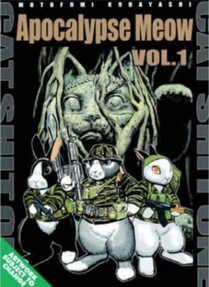Review
by Mikhail Koulikov,Apocolypse Meow
Graphic Novel 1
| Review: | ||||||||
War has always been a favorite topic of writers. Whether it be Ambrose Bierce and the Civil War, Ernest Hemingway and the First World War, or Tim O'Brien and Vietnam, every war America has been involved in over the decades has influenced novels, short stories and poems, as well as other media. And simply because of the effect Vietnam had on the American national consciousness, that war has been addressed in books and film time and time again
But never like this. If you look at the text bubbles alone, and somehow ignore the images, or even the cover, Motofumi Kobayashi's Apocalypse Meow (published in Japan as "Cat Shit One" and retitled for U.S. release) is a rather generic Vietnam War story, a tale about three American Special Forces soldiers' days fighting the Viet Cong. The missions Sergeant Perkins and the other two soldiers in his Cat Shit One team take part in read like they have been lifted from a hundred different Vietnam combat memoirs. They locate targets for artillery and air strikes, conduct reconnaissance missions and jungle patrols, defend a firebase during the Tet Offensive, get to experience Saigon wile on an R&R trip – in short, nothing anyone who has read even a couple of books on Vietnam hasn't already seen. Except, of course, for the fact that Apocalypse Meow is a manga, not a novel…and for the one gimmick from which this entire volume hangs. You see, Sergeant Perkins – Perky, and his two comrades, Rats and Bota – are rabbits. In fact, every human character in Apocalypse Meow is represented as an animal. The Americans are all rabbits, the Vietnamese (regardless of whether they are South Vietnamese, NVC or Viet Cong) are cats, the Chinese – pandas, the Russians – bears, the French – pigs. For the first five minutes of reading this book, you aren't quite sure whether this is the dumbest idea ever, or wonderfully innovative and subversive. Except if you know anything about the history of comics, it's neither, and is just more of the same. Cartoons and comics have always depended on 'funny animals,' and long before Kobayashi came along, other cartoonists had made the leap into using these same 'funny animals' in decidedly unhumorous settings. In Japan itself, animated films made during the Second World War featured anthropomorphic characters fighting to destroy the American enemy – while in America, Robert Crumb, and later, Art Spiegelman, used anthropomorphic characters to comment on the 1960's and WWII respectively. So with this in mind, Kobayashi's gimmick is just that – maybe enough to attract attention, but certainly not enough, in of itself, to justify spending Ten Dollars. Apocalypse Meow has to be judged on its own merits. From a graphical perspective, this is one of the most 'un-mangalike' Japanese comics out there. Bucking the trend, it is published in left-to-right format. None of the standard representational features of manga, either in character design or in page layout, are present. The pages themselves are densely packed with rectangles of image; there is virtually no use of negative space. The art, for its part, is hyper-realistic, especially when it comes down to depicting the tiny details of wartime such as weapons and uniforms. About half of one of the nine chapters is drawn using CG; here, background details are far less elaborate, and in general, the section feels like an experiment. Jeffrey and Masako Lilly's translation is almost uniformly excellent, there are only a couple of errors, and those may be in the original. The characters all speak naturally, as American GI's would. Again, it isn't clear how much of this is due to research put in by the author, and how much came in during the translation and editing process, but one thing is definite, a translation that sounded stilted and unnatural would have killed this title completely. Since the story does deal with a topic that calls for extensive use of jargon and military terminology, there are frequent footnotes, as well as several full-page sidebars that cover everything from the a brief overview of the colonial history of Southeast Asia to a description of the use of U.S. Special Forces troops in Vietnam. In addition, the volume also includes the original comic on which the Apocalypse Meow concept is based. Drawn and written by Kobayashi for publication in Combat Magazine, it also deals with an American's experience in Vietnam, but this time, the characters are human – and drawn in the style of American comics, rather than manga. As a war manga, a genre which has not been seen in the U.S. before, Apocalypse Meow is, if nothing else, unique. It is comparable directly not to other manga, but to recent Western war comics, like Garth Ennis' War Stories. Unfortunately, this means that it probably falls in between audiences: it does not appeal to most manga readers, but may be ignored by those interested in Western comics precisely because it is Japanese. Ultimately, Apocalypse Meow remains an interesting – but flawed – experiment. Whatever its reception in Japan, here, where Vietnam War stories – written by participants, not observers – are a dime a dozen, there is very little "Apocalypse Meow" can say about Vietnam that hasn't been said already. Perhaps the only point in its defense is that there remains some chance that a reader who for whatever reason is avoiding books will pick it up and learn at least something about America's role in Vietnam, but that lone point does not – cannot – save the whole book. |
||||||||
| Grade: | |||
|
Story : C
Art : B+
+ Certainly unlike any other manga currently being released in English |
|||
| discuss this in the forum (12 posts) | | |||
| Production Info: | ||
|
Full encyclopedia details about |
||
